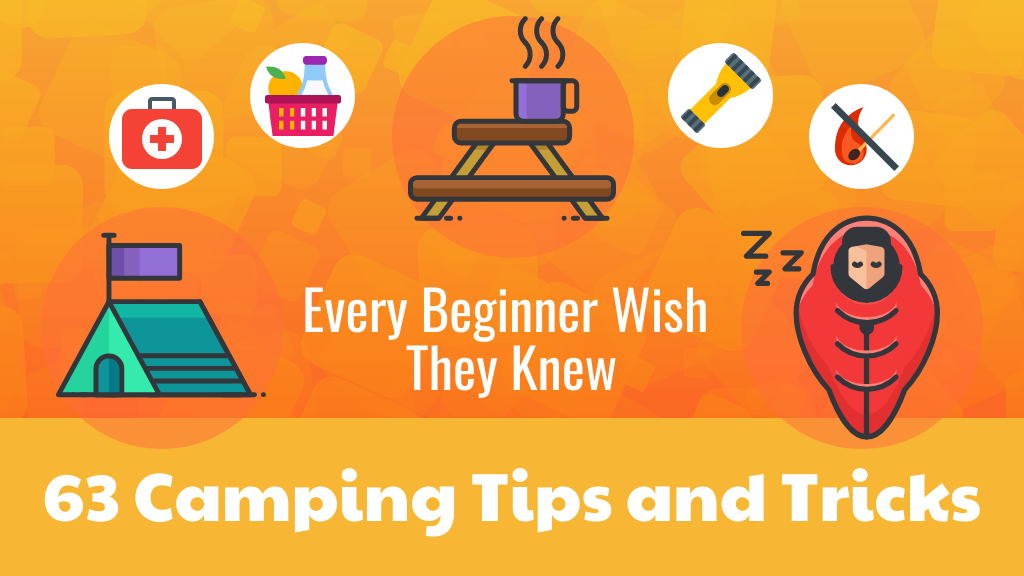
Camping is a great summer activity, especially when you know great spots to hike and pitch a tent. Whether you are bringing your RV or you are camping in a tent, there are a few tricks that will make your life easier once you are in that tent. Although you will be living life away from the comfort of your home, perhaps without a phone, you still need to be comfortable to enjoy your camping experience.
Below are 63 camping tips and tricks to help keep you comfortable at camp.
Extra fuel is a savior whether you plan to use a camp stove or an open fire. Most camp stoves light on butane gas canisters, and you need to ensure you have sufficient of those. Most campsites do not have a camp shop, and you might not even get a place to buy food in case your fuel runs out. If you are using a campfire, bring an extra lighter.
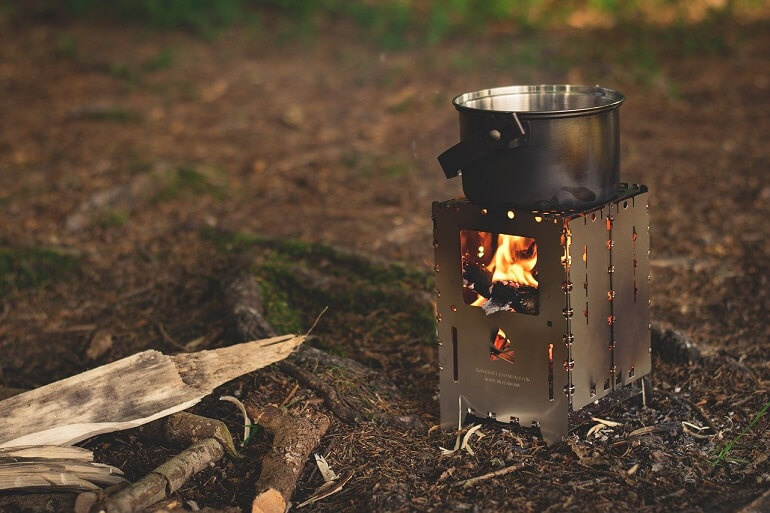
Most of the standard cooling boxes will only cool your food for 8 hours or less. When you are out camping, say for a week, you need a cooling box that can keep your food and other supplies cold for at least five days. If you camp in your RV or where you have access to an electric hookup, pick a cool electric box. It will save your food.
If you are not bringing dry food to the camp and you plan to cook every meal, then you need food storage bags, plastic storage containers, and foils to store your fresh ingredients and half-used ingredients.
If you want the ice in your cool box to last for more than a few hours, freeze your food as much as you can before you pack it in the cool box. If you do not have a way to freeze the food, chill the food overnight. The food at room temperature will melt the ice in the cool box within a few hours.
The camp is never complete without a campfire. Even if you will not be cooking from the fire, it is a great way to warm at night as you sit under the stars and talk with other campers. You need to bring matches and lighters. You can use a candle to light the wood. If you have never made a fire, you might want to read about that before you leave home.
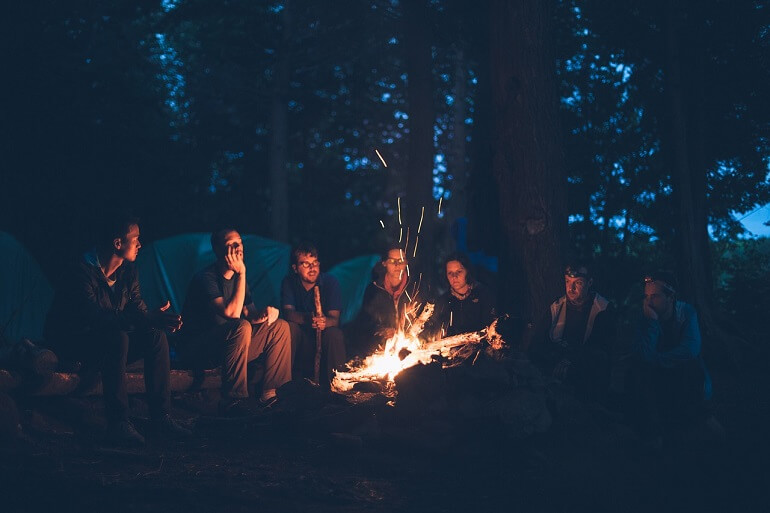
Planning your meals is important at home, but when you leave for camp, it is even more important. Planning your meals allows you to plan the ingredients and the equipment you need to pack. This is especially important when you camp with your kids.
Because you cannot bring spices in large jars, why not use empty tic-tac boxes to pack small amounts of spices for use in camp cooking. Write the names of the spices using a sharpie or print out the names and stick them on the tic-tac boxes.
You probably only need a few spices to use in a few meals during camp. If that is the case, seal once side of a wide straw with tape, add spices and seal the other end. Straws will take less space compared to tic-tac boxes.
You do not have to bring an expensive fire starter kit. Instead, bring regular charcoal and a cardboard egg carton. These are inexpensive ways to start a fire. All you need to do is buy your eggs in an egg carton. Avoid foam cartons as they will not burn.
You do not have to bring seasoning if you can bring a small branch of rosemary. As you burn your meat in an open campfire, burn the rosemary leaves. The rosemary smoke leaves a sweet flavor that most of the campers with you will love.
At the campsite, you only bring the essential equipment for preparing and cooking your meals. You may not bring your chopping board or different types of knives. As such, be sure to prep your food before you leave home to make the campsite cooking experience better. Store the ready ingredients in food bags or in storage boxes.
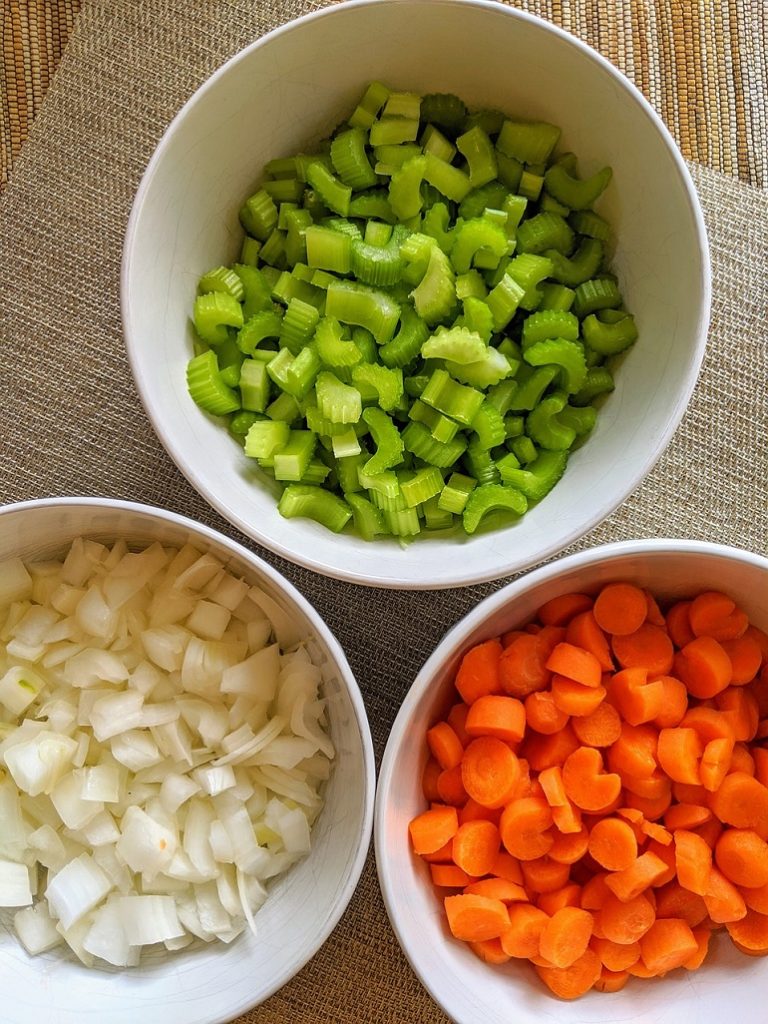
If you are camping away from the shops, you need to have enough snacks. Snacks are especially important when you camp with kids, or when you need to cook less. Bring fruits, cakes, nuts, crisps, and many more to munch on as you like.
Your cookware might rust when you are out camping. You can ensure that it doesn’t happen by placing silica gel inside the cookware. You only need one or two sachets of the silica gel in equipment to save your equipment and ensure your family doesn’t eat rust from the cookware.
The easiest way to limit the number of items you carry to the campsite is to carry versatile items. You will need a hand sanitizer to keep your hands free of germs, and you can use the same sanitizer to start a fire. The alcohol in the hand sanitizer lights fast, and all you need is dry wood.
If you still have some birthday candles from your last birthday, pack them to the campsite. These slender candles work great when you need to start a fire. All you need to do is light them and place them in the middle of the set wood, and you have a fire. You only need one or two of these candles, and you are good to go.
You can make coffee bags like teabags. Instead of using coffee pots to make coffee and waiting for the water to boil, make individual coffee bags, and all, you will need to make coffee in boiling water. Allow the coffee to seep to the strength of your liking.
If you need to grill your burgers or any other food and you are in the middle of the forest, the easiest way to do that would be using a tin can. Slice the tin can so you have a space to hold the charcoal and you are good to go. You can grill hotdogs, burgers, meat, and so many other items from the tin grill.
What will you do if the water you brought from home runs out? You need to learn how to purify water while out at the campsite. You only need a BPA-free bucket, a muslin cloth, and a few other supplies, and you are good to start purifying your water. You can also bring along a store-bought straw water filter.
If you plan on having a few drinks as you camp, you need to have a drinks holder. Just placing your drinks on the ground will not work as ants will not give you rest. If your budget is limited, you do not have to go for a drinks holder from the dollar store. You can make a DIY one at home. You can use a cloth to make the holder light.
It is easy to grill meat and not burn it over the campfire. You need a few cabbage leaves to wrap the meat for even cooking and to prevent burning the meat. The moisture in the cabbage leaves will ensure the meat doesn’t burn, and it also gets hot enough to cook your meat evenly.
If you need cups and plates, pick those that can easily pack into each other for ease of carrying. The spoons should pack into cups, the cups into plates, and bowls, and the pans should also pack into each other. You can buy camping utensils set to get this kind of equipment.
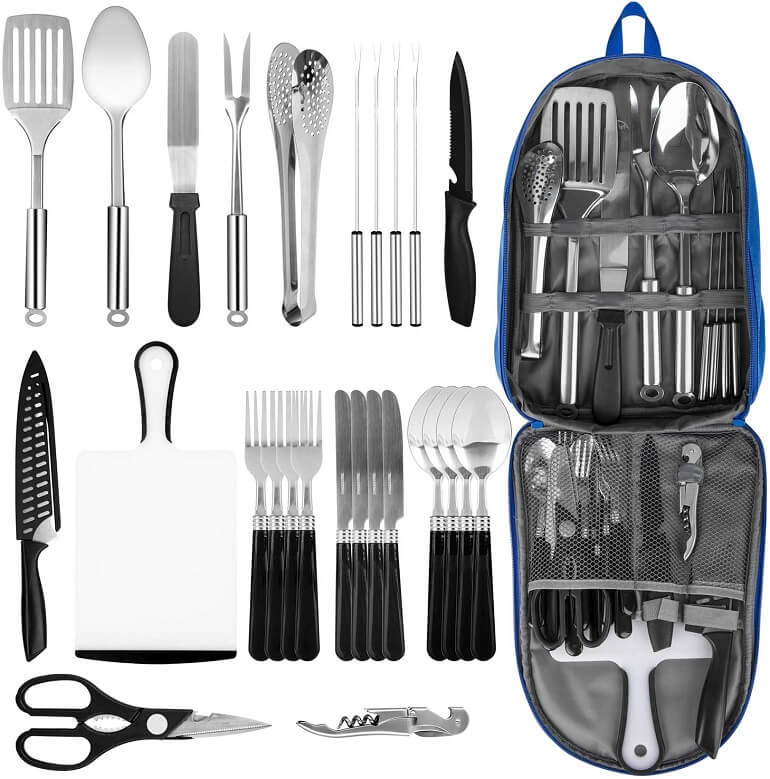
Instead of carrying a whole bottle full of oil, you can bring with you a small bottle of spray oil. The spray oil is more convenient for all meals, and it takes less space in your camping bag.
You need water, but you may not have enough space to fit a large plastic water bottle. A collapsible water carrier, therefore, comes in handy when you need clean water at the camp. Collapsible water carriers come in different designs – some are easy to use, and others will pose a challenge. Whichever carrier you pick, ensure it folds flat and remain rigid during use.
Whole eggs will crack in your cool box – unless you put them in a padded box. Again, they take up so much space. Instead of whole eggs, beat the eggs and put them in a clean water bottle. This way, you will only need to pour out the eggs when you need them. A small water bottle can carry eight eggs or more.
One of the easiest camping meals is pancakes. All you need is to bring your pan and prepared batter. Prepare the batter at home and pour it in sandwich bags or baggies. Store the batter in your cooler, waiting for the biggest camping breakfast. With a sandwich bag, all you do is snip one end and pour out the batter.

It will be colder than you think about sleeping in a tent. Many factors make camping cold – first, you might be sleeping near trees, and then you are on the highest point in the area to avoid areas that may flood if it rains. To stay warm, invest in a decent 3-season sleeping bag as it will warm you all night.
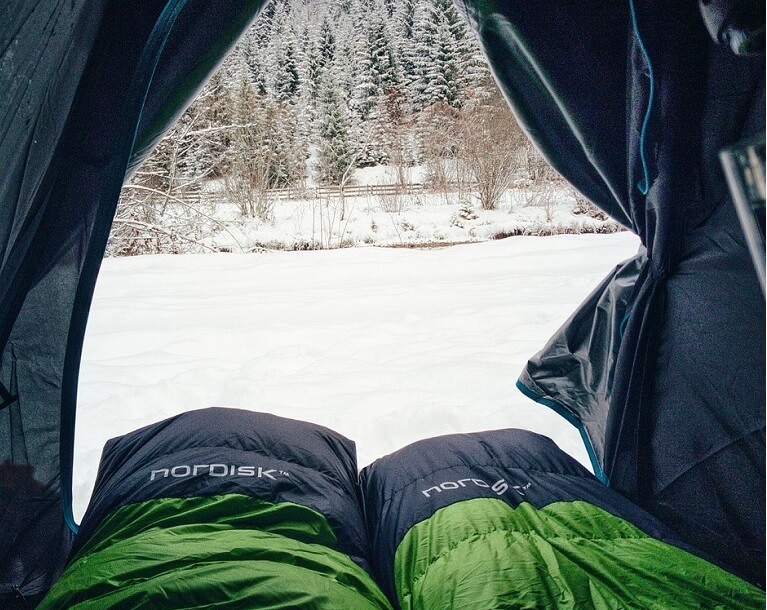
Even with a decent sleeping bag, you still need to bring extra blankets to keep warm. Feeling cold while sleeping is no fun, and this is why a blanket comes in handy.
You need a pillow to sleep comfortably, but carrying a whole pillow in your camping bag is just extra. Instead, stuff some clothes in your stuff sack, and you have a good pillow. All you need is a stuff sack as you will already have your clothes to stuff.
Sleeping on the floor might feel like the easiest way to save on space in your camping bag. However, most of the cold at night comes from the floor, and you will be warmer if you bring a comping bed or a foam mattress to insulate the surface. Foam padding provides great insulation and keeps you off the floor for a warm night.
You might need to visit the loo several times in a night, especially if you camp with the kids. A camp loo comes in handy to save you the trips to and from the toilet blocks at the campsite. The loo fits in your large multi-room family tent. Better yet, you can bring a popup toilet tent inside the large tent. Dispose of the waste accordingly in the morning.
Most campsites offer set pitches, so all you do is set your tent, and you are good to go. However, some campsites allow you to pick the tent location. If the campsite allows you to choose where you pitch your tent, choose a flat location. Be sure to consider the nearness to the toilet, play areas, and paths. Such areas are busier and noisier, and you will not have any privacy.
Tents come with strong YKK zips, and although most of these zips run smoothly, they might fail after so many uses. A little candle wax from an unlit candle will get your zips back on the road, and you will still use your candle the same way you would have used them.
It is okay to want to experience nature in its raw state, but you also want to be comfortable while at it. Instead of having a simple tent and a sleeping bag as the only things you have, bring extras such as a picnic rug, a folding chair, a tent carpet, and others that will make your camping experience something worth remembering. These extras are easy to bring when you bring your car to the campsite.
Pebbles, twigs, sticks, and other small items can damage the groundsheet of your carpet. They also feel uncomfortable under your feet once you set up the tent. Before you pitch the tent, remove all manner of items from the ground. If you can, slash long grass around the tent area so there are fewer bugs where you sleep.
You can create shade if your tent lacks a built-in canopy. An awning or tent extension keeps you comfortable when the sun shines hot outside, and you need to stay cool and protect your tent. However, for added privacy in a crowded campsite, use windbreaks. Ensure your windbreaks do not encroach into adjoining pitches, and the campsite allows them.
Most tent pegs are weak, and they may not hold your tent as securely as you need them to. If the pegs that came with your tent are weak, invest in heavy-duty pegs. This way, you will have an extra set of pegs, and you are sure the pegs are strong enough to protect your tent from strong wind.
Are you camping for the first time? Try pitching your tent before you leave home and see how it works to avoid any disappointments. First-time campers have soaked in rain setting for tent for more than one hour. This is also the easiest way to ensure that you brought all the installation supplies.
Maybe your idea of camping is getting away from appliances and the normal home life and becoming one with nature. However, you still want to feel comfortable in your tent, especially if you will camp for a week or more. Summer camps can get really hot, and this is why an air conditioner comes in handy. You can bring a Styrofoam cooler and a few other supplies to stay cool on a hot day.
This is a golden camping rule – arrive early. You should be at the campsite at least three hours before darkness sets in. This way, it will be easy to find your pitch and set up your tent before darkness falls. Working with a torch at night trying to find a pitch will not work, and you will most likely find something wrong.
Nothing can be as disappointing and unsettling as water flowing through your tent. You can start by picking a flat pitch and then digging a trench around your tent. Use a shovel or a large stick. You do not need a large trench, just one that is deep enough to direct rainwater away from your tent.
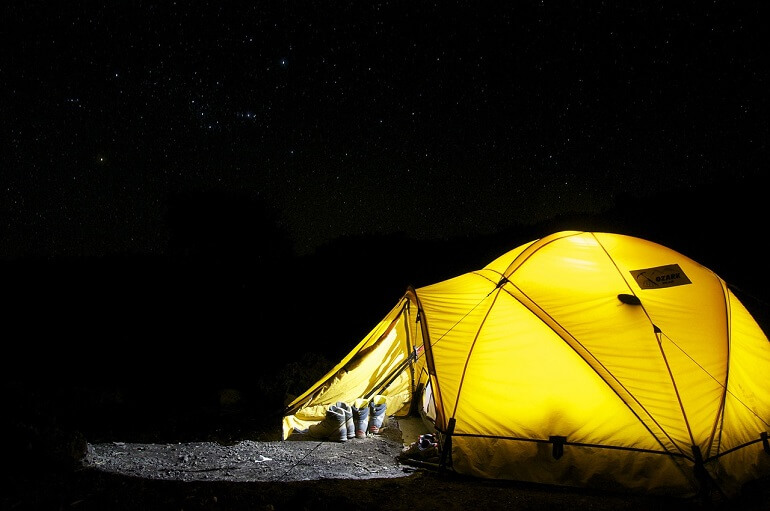
A clean and soft pair of shoes keep you comfortable and warm inside your tent if the weather gets rough. You can pick tall cloth boots that are soft and comfortable enough to sleep on.
You must pick the right campsite for your comfort. Before you arrive at the campsite, ensure you read and understand the rules, and be sure to follow them once you land at the campsite. The rules range from simple ones such as no noise after 10 pm to no pets, and no campfires.
You do not want to bring mud inside your tent to keep the groundsheet clean and dry. A doormat is a barrier to the mud and wetness.
After you disassemble your tent, walk around, and ensure you pick all the litter and other items to ensure you do not leave dirt around the area – it might not be on the rules, but it is good practice to pick litter.
How you pack your car determines how easy it will be to unpack once you get to the campsite. The items you need first at the campsite should be packed last to make them accessible. Your tent, pegs, mallet, and many others should be packed last so you can set up a tent before you unpack other items.
It is not uncommon for one to forget an important camping supply, say a lighter or a torch or your raincoat. To avoid the rush of packing items at the last minute, create a checklist of all the items you will need to ensure you do not forget anything. Keep revising the list to include things you might have forgotten.
You need to save as much space as possible in your camping bag. One way to save space in your camping bag is to roll shirts and t-shirts and other small articles and stuffing them into socks. This way, the sock compresses them, and you save space.
Even if the weatherman says, it will be sunny for the next few weeks, always prepare for bad weather. Bring a light raincoat and light waterproof trousers. Waterproof boots are also ideal as they will help you get through long grass with dew at night. Again bring thermals as the nights get chilly when you are out camping. Think layers when you pack your camping bag.
Ticks can be a problem during camping. To ensure you are safe from them, bring a natural tick deterrent for your family and your pets. Keep the deterrent with you every time to ensure you keep the ticks away.
Ticks are not even as common as mosquitoes. Your tent might be tight with nets in vents, but a mosquito might still find its way into the tent. Bring mosquito and bugs repellant to wear all the time. It is important the repellant is natural so as not to harm you, your family, pet, or the environment.
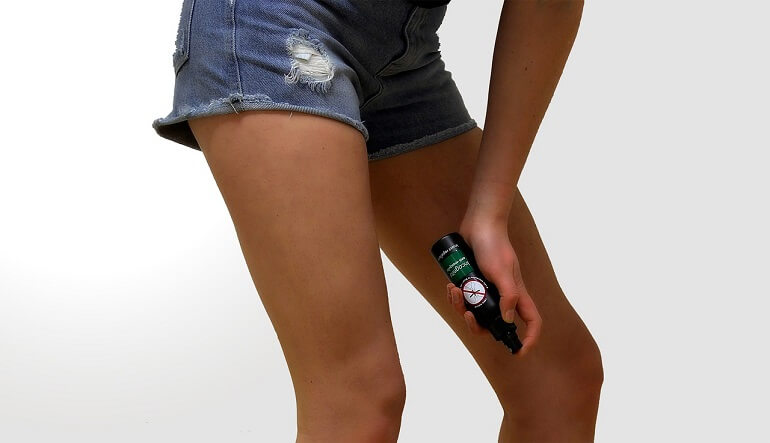
Unless you know how to start a fire using flint, you need to keep your matches clean and dry at all times. Pick any plastic container with a tight lid and keep your matches there. If you have a plastic bag, it will even serve you better as it takes less space in your camping bag.
A handheld torch is not convenient when you are in a tent, reading or doing other tasks. As such, you need to bring a lantern as it brings more practical light. Unlike a torch, you can hang your lantern during use for more convenience. That doesn’t mean that you shouldn’t bring your torch – the torch has its place.
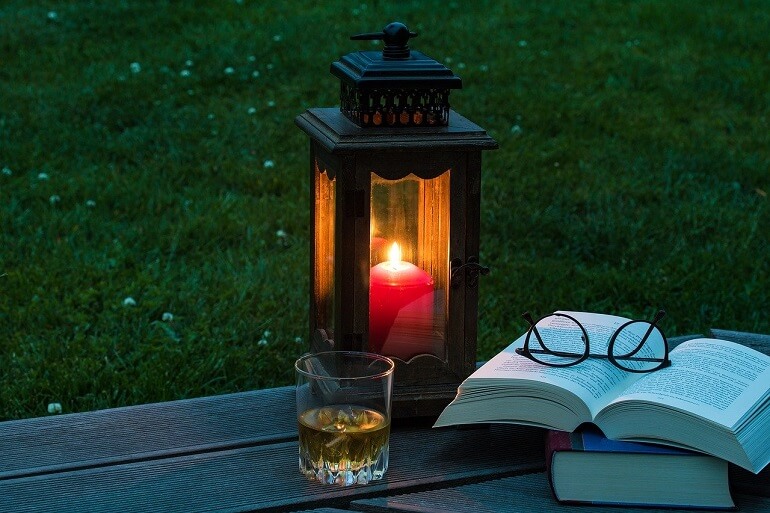
You probably will not need your phone when you go camping. However, you need to keep it charged in case of an emergency. Anything can happen when you go out hiking and a phone is the easiest way to call for help. Because you may not be near an electric outlet, a solar charger will help you power up your phone with ease.
You will crave for a shower when you go out camping, but you might not be anywhere near this amenity. However, you can make a DIY camp shower using a rectangular water jug and a few other items. Find a string branch and hang your shower, and you are good to go.
The deodorant does more than keep you fresh. If bugs bite you or you develop itches while you camp, you can use deodorant to treat that. Rub the deodorant on the bite or the itchy area and give it a few minutes. To save on space, pick a small deodorant on sale and bring it to camp.
Wet shoes feel uncomfortable. You can keep your shoes dry by using a beeswax compound. If you plan on hiking as you camp, waterproof shoes will keep your feet dry at all times. This way, your shoes will not be stinky, and neither will they damage from the wetness.
Kids may not understand the beauty of interacting with nature. If your kids do not enjoy hiking, fishing, or swimming, you need to bring the games they can enjoy in the form of activity bags. Take a Ziploc bag and fill it with fun activities for the kids to enjoy as the adults fish or swim.
You do not have to pack your selfie stick and take all that bag space. As long as your phone or camera has a timer, a wooden selfie stick will work just fine. You can also use sticks to make a tripod for your camera or telescope. If you do not to use sticks, bring a smartphone tripod and take steady photos and videos from the campsite.
You do not need an entire professional first aid kit. You can create small mini packs with only the essentials. Bring a bandage, alcohol, wool, antibiotics, and painkillers. If any of the family members has a special condition, remember to pack their medication too. Instead of a bulky plastic box, create small packs using small bags that can fit in your coat pocket.
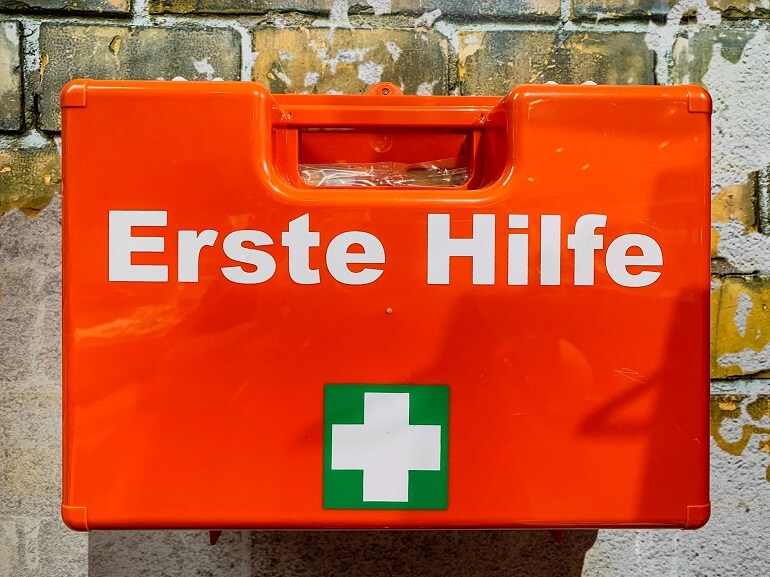
A whistle comes in handy when you are camping. If you are ever lost or in any form of danger, a whistle will help you call for help. You can make a simple whistle from an acorn cap. It is easy to find acorn anywhere you go camping. All you need is to practice whistling using an acorn cap.
Dryer sheets will keep your clothes smelling fresh when you put them in your clothes bag. These sheets also keep gnats and other insects away from your clothes. You can place the sheet in your tent near you when you sleep and place one in your pocket when you go out hiking.
If you plan on hiking, a map and a compass are some handy tools you need to navigate the terrain. Again, ensure you can read the map before you leave home, so you never get lost in the woods. If you are hiking in groups, always have a plan to contact each other if you are lost.
Instead of large towels, bring these small towels as they take less space and dry fast after using.
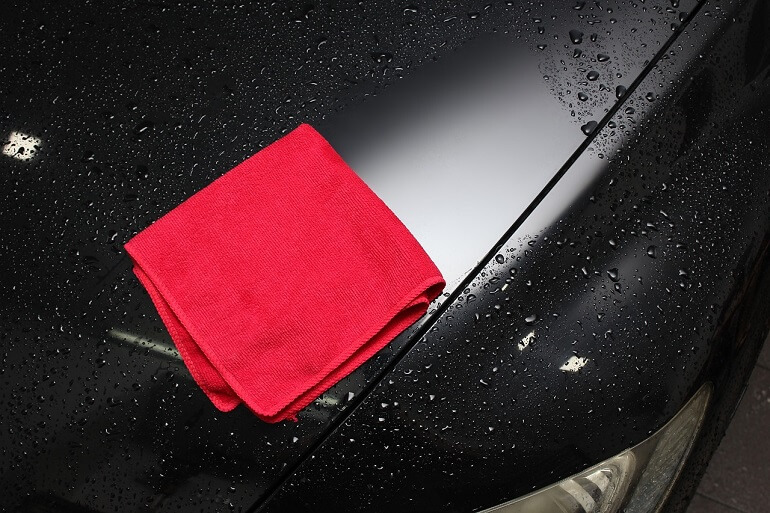
When planning for a camp, ensure you have a checklist not to forget anything. Again, consider making the camping experience as comfortable as possible. One of the main culprits is cold which affects you mainly at night. Be sure to keep that off. If you want to know the ten essentials for camping, here is an article for you.
© 2021 by OutdoorStuffGudies.com
OutdoorStuffGudies.com is a participant in the Amazon Services LLC Associates Program, an affiliate advertising program designed to provide a means for sites to earn advertising fees by advertising and linking to Amazon.com.